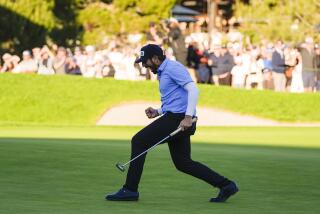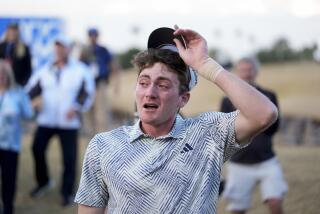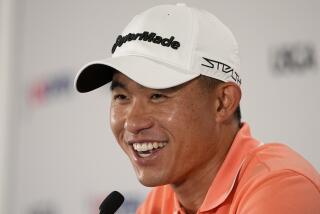Fallen From Great
- Share via
SANDWICH, England — David Duval is back, at least geographically. So, yeah, it has been quite a dry spell the last two years, since Duval stood up to the weighty challenge at Royal Lytham and won the 2001 British Open with characteristic cool, a 65 on Saturday followed by a 67 on Sunday.
He hasn’t won since and has come close only once. But now Duval has returned to the continent where he experienced his greatest victory, looking for something good once again, this time at the first Open Championship in 10 years at Royal St. George’s.
For Duval, it doesn’t have to be great, only something that might bring a twinkle to those eyes carefully hidden behind windshield-sized dark glasses and a smile to that preternatural frown he wears.
The statistics and the body language don’t lie. There is a huge chasm between Duval, the player who won by three shots at Lytham to win his first major title after 26 tries, and the Duval who has played 15 times this year and missed 11 cuts.
The Continental Divide?
This Duval is a combined 87 over par in 37 rounds this year, is 186th in driving accuracy and 187th in greens in regulation, was treated for vertigo and was slammed by the media for not caring enough about his golf.
And one more thing: This is the same David Duval who might actually have a shot at winning the British Open.
Strange world, isn’t it?
Last week at Ponte Vedra Beach, Fla., Duval pounded ball after ball on the driving range. He sent them screaming away, which is sort of what Duval could have done to himself, considering how far south his game has moved in the last 24 months.
“There’s a lot of things that happened,” he said recently. “In some ways, I’ve been insulted by it, and some ways I’ve gotten a real kick out of it, especially the talk of lack of desire, of lack of work ethic.
“I had injuries and vertigo, that illness, whatever. So many obstacles thrown my way. But it hasn’t hurt my love of the game. The lack of performance has certainly bothered me, but bothered me because I expect a lot more of myself when I play the game, because I know I’m good.”
There’s no question about that. His breakout year was 1999 when he won four times before the Masters, the first player to do that in 25 years, since Johnny Miller turned the trick. He took over the No. 1 ranking from Tiger Woods, albeit briefly. He eagled the last hole to shoot a 59 on the last day at the Palmer Course at PGA West to win the Bob Hope. He passed $3 million in prize money before anybody else.
Duval was on top of the world, even if he had to share it with Woods. At least he was considered as close an equal to Woods as there was.
There was every reason to feel that way. In an 18-month span, from late September 1997 to early April 1999, Duval won 11 times, including the last three events of 1997, the NEC World Series of Golf in 1998 and the Players Championship in 1999. He also made more than $7 million.
He earned $5 million more in 2000 and 2001, winning tournaments both years. Duval made 18 cuts in 19 events in 2000, was in the top 10 nine times and won the Buick Challenge. And in 2001, his British Open breakthrough year, Duval overcame a wrist injury early in the season to post seven more top 10s. He was second to Woods at the Masters after a 67 on Sunday and was second again at the Buick Challenge, where he lost in a playoff with Chris DiMarco after he closed with a 63.
After that, it has been a quick trip downhill, a more rapid descent than he experiences in his favorite off-duty pastime, snowboarding at Sun Valley, Idaho.
On Jan. 1, Duval was still ranked 15th in the world; he is now 87th.
It may be that Duval has bottomed out. He worked hours on his swing with David Leadbetter at Leadbetter’s teaching school in Bradenton, Fla. That has helped.
And then, on the second day of the Byron Nelson tournament in May, Duval officially changed directions. He sought the help of Dr. Gio Valiante, a professor of psychology at Rollins College in Winter Park, Fla.
“Everybody hits a rough patch,” Valiante said. “He never got the wind knocked out of him before. He’s trying to find his way out.”
Valiante is a sports psychologist who has written a book called “Fearless Golf,” and a colleague of Dr. Bob Rotella. His clients include Chad Campbell, Heath Slocum, Billy Andrade, Bryce Molder and, in association with Rotella, Davis Love III.
Right now, there are two working areas for Duval, Valiante said. They are identifying and understanding what got him to this point and then to figure out how to make corrections. Valiante believes Duval’s problems on the golf course are not mechanical, but rather due to bad habits.
Duval had become very tight and very quick. That is tight in his grip pressure and quick in his swing. He always has had a tendency to pull his head up after his swing and that movement had become even more noticeable, which translated into blocking shots to the right.
“They were so far right, they were in different area codes,” Valiante said.
Duval shot a 69 in the second round at the Byron Nelson, but he missed the cut because he opened with a 77. At the Memorial, Duval tied for 64th, but he made his first cut since the Nissan Open in February. Duval also made the cut the next week at Avenal at the FBR Capital Open, thanks to a 62 on Friday.
After that round, Duval realized he finally was onto something good, even though he hadn’t been playing well for a long time.
“That’s a tough one,” he said. “And that’s kind of where talking with Gio has been more beneficial, because I’ve learned a lot about myself. I’ve recognized different things and different aspects of my life, not even in golf, but other places, patterns that I fall into. And to be evolving like that and to see some changes is a good thing.”
But before the good things began happening, Duval missed the next two cuts. He shot 10 over at Olympia Fields at the U.S. Open and then missed the cut at Westchester at two over.
Preferring to emphasize the positive, Valiante says it’s a start. He expects Duval to start surprising people, maybe sooner than anyone thinks.
“He’s really correcting bad habits rather quickly,” Valiante said. “He’s hitting fairways again, looking at more birdies, and there are no more double bogeys.
“This is not a pep talk. I’d tell you if it was two-three months away, but I’ll tell you this, he’s not that far off. Really and truly, he’s pretty close. That 62 was no fluke. It wouldn’t surprise me at all if he played well in the British Open.”
Duval turns 32 in November, and that’s around the age that players reach their peak. It may be that Duval’s turn came a lot sooner than normal, or he could have even greater days ahead. But if so, Duval must return to the strengths of his spectacular 1999 season when he ranked third in greens in regulation. It has been a steady slide since then. In 2001, he ranked 35th and last year he fell all the way to 100th.
Top players such as Woods, David Toms and Jim Furyk, who have been asked about Duval, believe he’s going to come back.
“I played a lot of golf with him when he was at the peak of his game, ranked No. 1 in the world, he’s too good, got too much talent, got too much drive,” Furyk said. “We all go through peaks and valleys. He’s had a real high peak, now he’s at his lowest valley. But he’s going to climb out of it.
“I don’t know exactly when that’s going to be, but I think he’ll be just fine and he’s going to start winning golf tournaments again.”
All in all, last year is something Duval says he has forgotten.
He didn’t win a tournament for the first time since 1996, his top 10s had dwindled to two, he missed the cut at the Masters and the U.S. Open and won less money than in any year since he joined the PGA Tour in 1995.
Of course, he wasn’t completely sound, either. He battled nagging back and shoulder injuries, and if that wasn’t painful enough, he also broke up with his fiancee, Julie McArthur, his girlfriend of eight years.
It was a particularly difficult period, Valiante says.
“None of us can have an eight-year relationship ... and not have a reaction to that,” he said.
There has been an accumulation of factors contributing to Duval’s descent, none of them at all comforting, Valiante says.
“I’m pretty sure what has happened with David, after climbing something so high for so long, there’s a natural letdown. You decompress. He got blindsided. He’s led a charmed life in golf. Golf was easy for him. He never knew how to deal with adversity.”
You can’t say that about Duval anymore, because he has been dealing with it for about 24 months now.
Last year is over, as Duval says. Also gone is 2001, a distant memory of something that was won . . . and something that has been lost ever since.
Maybe Duval has bottomed out and he’s ready to climb out to take his place among golf’s hierarchy again. Maybe it’s his time again. At the very least, he’s on familiar ground.
*
(BEGIN TEXT OF INFOBOX)
Sinking Fast
David Duval has fallen on hard times since winning the British Open in July 2001. A look at how he has fared each year since then:
2001 (AFTER BRITISH OPEN)
*--* TOURNAMENTS 6 WINS 0 TOP 10 3 MISSED CUT 0 MONEY $754,267
*--*
2002
*--* TOURNAMENTS 24 TOP 10 2 MISSED CUT 8 MONEY $838,045
*--*
2003
*--* TOURNAMENTS 15 TOP 10 0 MISSED CUT 11 MONEY $84,708
*--*
More to Read
Go beyond the scoreboard
Get the latest on L.A.'s teams in the daily Sports Report newsletter.
You may occasionally receive promotional content from the Los Angeles Times.










